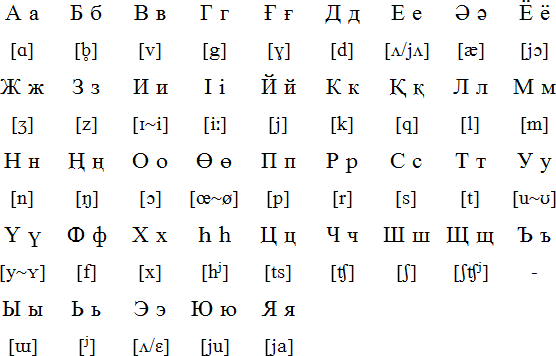Tofa is a Northern Turkic language spoken in Irkutsk Oblast in the southeast of the Russian Federation. Tofa speakers live in the villages of Tofalar (Тофалар), Nerkha (Нерха) and Verkhnyaya Gutara (Верхняя Гутара) in the Nizhneudinsky district in the southwest of Irkutsk Oblast.
In 2010 there were 760 Tofa people, and fewer than 40 of them spoke Tofa fluently. Another 50 or so had some knowledge of the language. Tofa speakers are all older adults, and younger Tofa people speak Russian. As a result, the language is classified as moribund.
Tofa is also known as Karagas, Kamas, Karagass, Karagassisch, Karagasy, Khotowci, Taiga Sayan Turkic or Tofalar. It is closely related to Tuvan.
Until 1988 Tofa was unwritten, except in the works of scholars, who used the Cyrillic and Latin alphabets to write the language. A version of the Cyrillic alphabet for Tofa was adopted in 1988.

Download an alphabet chart for Tofa (Excel)
Details of the Tofa alphabet provided by Wolfram Siegel (PDF, in German)
Чер өғлуғ, неңгес сыстықтығ
Көътүрүп увас, көруп танывас
Чүмесин аэтқан блаа даг hаэрhаннар
Чер өғлуғ чүмесин аэтып берген
Merciful mountain gods gave something
Having an earthen house and a fur pillow,
Something impossible to pick up and know
Gave away something having an earthen house
(A prayer for a successful bear hunt)
Source: https://ru.wikipedia.org/wiki/Тофаларский_язык#Пример_текста
Details supplied by Wolfram Siegel and Jin Wei Hii
Information about Tofa | Numbers
Information about the Tofa language
http://en.wikipedia.org/wiki/Tofa_language
http://ru.wikipedia.org/wiki/Тофаларский_язык
http://lingsib.iea.ras.ru/ru/languages/tofa.shtml
https://www.ethnologue.com/language/kim
Altay, Äynu, Azerbaijani, Bashkir, Chagatai, Chelkan, Chulym, Chuvash, Crimean Tatar, Dolgan, Fuyu Kyrgyz, Gagauz, Ili Turki, Karachay-Balkar, Karaim, Karakalpak, Karamanli Turkish, Kazakh, Khakas, Khalaj, Khorasani Turkic, Krymchak, Kumandy, Kumyk, Kyrgyz, Lop, Nogai, Old Turkic, Qashqai, Romanian Tatar, Salar, Shor, Siberian Tatar, Soyot, Tatar, Teleut, Tofa, Turkish, Turkmen, Tuvan, Urum, Uyghur, Uzbek, Western Yugur, Yakut (Sakha)
Abaza, Abkhaz, Adyghe, Aghul, Akhvakh, Akkala Sámi, Aleut, Altay, Alyutor, Andi, Archi, Assyrian / Neo-Assyrian, Avar, Azeri, Bagvalal, Balkar, Bashkir, Belarusian, Bezhta, Bosnian, Botlikh, Budukh, Bulgarian, Buryat, Chamalal, Chechen, Chelkan, Chukchi, Chulym, Chuvash, Crimean Tatar, Dargwa, Daur, Dolgan, Dungan, Enets, Erzya, Even, Evenki, Gagauz, Godoberi, Hinukh, Hunzib, Ingush, Interslavic, Itelmen, Juhuri, Kabardian, Kaitag, Kalderash Romani, Kalmyk, Karaim, Karakalpak, Karata, Karelian, Kazakh, Ket, Khakas, Khanty, Khinalug, Khorasani Turkic, Khwarshi, Kildin Sámi, Kili, Komi, Koryak, Krymchak, Kryts, Kubachi, Kumandy, Kumyk, Kurdish, Kyrgyz, Lak, Lezgi, Lingua Franca Nova, Lithuanian, Ludic, Macedonian, Mansi, Mari, Moksha, Moldovan, Mongolian, Montenegrin, Nanai, Negidal, Nenets, Nganasan, Nivkh, Nogai, Old Church Slavonic, Oroch, Orok, Ossetian, Pontic Greek, Romanian, Rushani, Russian, Rusyn, Rutul, Selkup, Serbian, Shor, Shughni, Siberian Tatar, Sirenik, Slovio, Soyot, Tabassaran, Tajik, Talysh, Tat, Tatar, Teleut, Ter Sámi, Tindi, Tofa, Tsakhur, Tsez, Turkmen, Tuvan, Ubykh, Udege, Udi, Udmurt, Ukrainian, Ulch, Urum, Uyghur, Uzbek, Veps, Votic, Wakhi, West Polesian, Xibe, Yaghnobi, Yakut, Yazghulami, Yukaghir (Northern / Tundra), Yukaghir (Southern / Kolyma), Yupik (Central Siberian)
Page last modified: 31.12.23
[top]
You can support this site by Buying Me A Coffee, and if you like what you see on this page, you can use the buttons below to share it with people you know.

If you like this site and find it useful, you can support it by making a donation via PayPal or Patreon, or by contributing in other ways. Omniglot is how I make my living.
Note: all links on this site to Amazon.com, Amazon.co.uk
and Amazon.fr
are affiliate links. This means I earn a commission if you click on any of them and buy something. So by clicking on these links you can help to support this site.
[top]